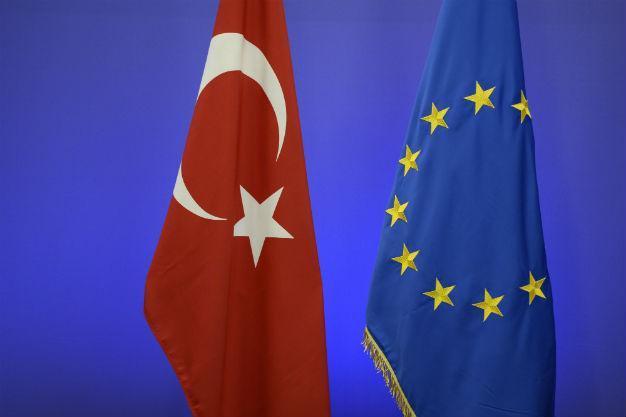New EU chapter to open Dec. 14, with reforms on Turkey’s agenda
ANKARA

AFP photo
With the EU clearing the path for the opening of at least one of the five chapters currently closed in Turkey’s long-stalled accession process, Ankara has turned its attention to a series of legislative reforms.
After five years of standstill in negotiations with the EU, Chapter 17 on Economic and Monetary Policy will be opened for negotiations on Dec. 14. Brussels and Ankara accelerated the process after recently signing a deal to stem the flow of refugees from Turkey to the EU.
The Turkish government held a “Reform Action Group” meeting on Dec. 11 and pledged to continue to “improve the rights and freedoms of Turkish citizens with new reforms in line with Turkey’s 2023 objectives and on the basis of the comprehensive transformation realized to this day,” a press statement by Turkey’s EU Ministry said.
It identified a Turkey-EU Summit in Brussels on Nov. 29, 2015 as “unique,” as it was the first meeting attended by Turkey, the 28 EU member states, and the presidents of the European Council, the European Commission and the European Parliament.
“A new period has started in Turkey-EU relations based on mutual trust. Turkey will decisively do its share by taking result-oriented steps in order to make good use of this period,” read the EU Ministry’s statement.
The Reform Action Group meeting on Dec. 11 mainly addressed work necessary for visa-free travel for Turkish citizens to the Schengen Area as of October 2016. In this context, legal arrangements and operational steps required for the implementation of the EU-Turkey Readmission Agreement and the Visa Liberalization Road Map were discussed.
Legislation for visa-free travel to Schengen areaIn order to enable Turkish citizens’ visa-free travel to the Schengen area, legislative changes to the following areas are planned:
The Law on the Protection of the Personal Data; the Law on Political Ethics; the Law on the Ratification of the Agreement on Tripartite Contact Centre of Turkey, Greece and Bulgaria; the Law on the Ratification of the Council of Europe Convention for the Protection of Individuals with regard to Automatic Processing of Personal Data and its Additional Protocol No. 181; the Law on the Ratification of the Council of Europe Convention on Action against Trafficking in Human Beings; the Law on the Ratification of the Council of Europe Convention on Laundering, Search, Seizure and Confiscation of the Proceeds from Crime and on Financing of Terrorism; the Law on the Ratification of Protocol No.7 to the European Convention on Human Rights; the Law on the Ratification of the Additional Protocol of 1997 to the Convention on the Transfer of Sentenced Persons; the Law No. 6458 on Foreigners and International Protection; legal amendments for the completion of transition to identity cards with biometric data; passing a law allowing access to the labor market by Syrian citizens under temporary protection; the Law on Judicial Cooperation in Criminal Matters; the Law on the Establishment of the Law Enforcement Monitoring Commission; legislative arrangements for the transposition of Council of Europe Convention on Laundering, Search, Seizure and Confiscation of the Proceeds from Crime and on Financing of Terrorism; the Law on the National Human Rights Institution; legal arrangements regarding the fight against cybercrime; the Law on Anti-Discrimination and Equality; the Law on the Ratification of the Additional Protocol of 1975, 2010 and 2012 to the European Convention on the Extradition of Offenders; the Law on the Ratification of the Additional Protocol of 2001 to the European Convention on Mutual Legal Assistance in Criminal Matters; the Law on the Ratification of the Hague Convention on Jurisdiction, Applicable Law, Recognition, Enforcement and Co-operation in Respect of Parental Responsibility and Measures for the Protection of Children; and the Law on the Ratification of the Hague Convention on the International Recovery of Child Support and Other Forms of Family Maintenance.
Along with the legal arrangements, the following operational measures are planned to be implemented:
* Increasing the number and capacity of removal centers in order to enhance Turkey’s readmission capacity of irregular migrants.
* Increasing the capacity of the Coast Guard Command to combat irregular migration via sea.
* Drafting implementation protocols for readmission which are necessary for the implementation of the Turkey-EU Readmission Agreement and signing these readmission protocols with the relevant EU member states.
* Maintaining cooperation with the EU member states within the framework of the current bilateral readmission arrangements.
* Ensuring the immediate conclusion of pending applications for international protection.
* Launching new efforts after an evaluation of the previous steps taken to find solutions to the problems of the Roma citizens and implementation of the relevant Strategy and Action Plan in a short period.
Political reform process to focus on Chapter 23 and 24
As the second agenda item of the Reform Action Group, the political reform process was discussed and the government decided to open Chapter 23 on “Judiciary and Fundamental Rights” and Chapter 24 on “Justice, Freedom and Security” as soon as possible.
For both of these chapters, Turkey has met all the opening benchmarks that were conveyed unofficially, according to the EU Ministry.
It said “political reforms that will strengthen the foundations of democracy within the framework of Turkey’s objective of achieving a pluralist, liberal and participatory democracy, will be crowned with a new constitution that will completely remove the effects of the [Sept. 12 military coup].”
Regarding the judiciary, steps will continue to be taken with reference to the Judicial Reform Strategy announced last April.
Regarding fundamental rights and freedoms, the implementation of the Action Plan on the Prevention of the Violation of the European Convention on Human Rights will be carefully monitored.
Chapter 24 was discussed with reference to the work being carried out for the Visa Liberalization Dialogue.
The Action Plan against Organized Crime was discussed along with steps to be taken for border security.
